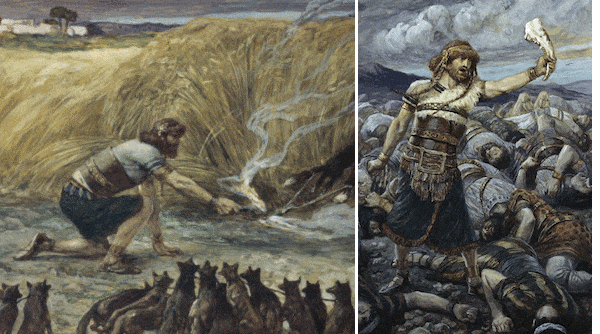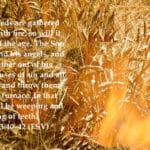Samson Part 3: Vengeance at Firefox Field and Jawbone Hill
Exod 17:1-7; Judges 15:1-20; 1 Cor 10:1-5
October 9, 2016 • Download this sermon (PDF)
Congregation of Christ: I’m not sure if they still teach World History in high school these days, but do you know that there was a Thirty Years’ War in Europe from 1618-48? This war was also known as the religious wars. It began when Holy Roman Emperor Ferdinand II of Bohemia (present-day Czech Republic) suppressed the religious freedom of Protestants. The Protestants then appealed to other Protestant states of England, Netherlands and Denmark for help. King Ferdinand, in turn, called the German Catholics, Austria, Spain and the Pope. This begun 30 years of invasions and counter-invasions that involved Europe’s great Protestant powers of England, Protestant Germany, Netherlands, Sweden and Denmark against Catholic Germany, Spain, the Vatican. France often sided with the Protestants because of their fear of Spain.
For these 30 years, warring Protestant and Catholic troops, many of them mercenaries, committed atrocities against each other and the people. Finally, in 1643 and 1645, Catholics suffered two major defeats, which led them to make concessions to the Protestants in the Peace of Westphalia in 1648. But the 30 years of the cycle of violence and retaliation was great: nine million lives; 20 percent of Germany’s population; manufacturing, farming, and trade suffered. It was the greatest catastrophe in German history until World War II.
 Such was the story of Samson, the Philistines and the Judahites in our text. We read about a continuous, escalating cycle of violence and vengeance between Samson and the Philistines. The Judahites were also involved, even if indirectly. And what was God’s response to his appointed deliverer, but rebellious Samson? It was one of mercy in renewing his strength.
Such was the story of Samson, the Philistines and the Judahites in our text. We read about a continuous, escalating cycle of violence and vengeance between Samson and the Philistines. The Judahites were also involved, even if indirectly. And what was God’s response to his appointed deliverer, but rebellious Samson? It was one of mercy in renewing his strength.
Samson: “As They Did to Me, So Have I Done to Them”
Our text opens with a romantic Samson. After sulking and raging against his 30 groomsmen, and leaving his weeding feast, he turns up at his bride’s house with a young goat. This must have been his 12 roses to allure her to her bedroom. Remember Judah, who wanted to have intimate relations with a woman whom he didn’t know was his daughter-in-law Tamar? He offered her a young goat as payment (Gen 38:16-17).
His father-in-law’s jaw dropped. Drops of sweat flowed from his face. The ghost of the wedding feast had returned! He had given his daughter to Samson’s best man, so he offered his younger daughter, more enticing than Samson’s wife. But the object of his eyes had never left him. In rage, he vowed that he would do another damage to these Philistines. With 300 foxes—not a small feat—and torches, he burned their fields: all the grain, stacked and standing, and their olive orchards. Now, this was not a small loss for the Philistines. Their lives depended on it, and now what would they eat until the next harvest? Famine and starvation is not a remote possibility.
Philistines: “We Have Come to Do to Him as He Did to Us”
So the Philistines struck back, fire with fire. Instead of seeking out Samson, whose superhuman strength they already knew, they burned Samson’s wife and his father-in-law. The cycle of retaliation escalates when Samson singlehandedly kills many more Philistines, leaving them in a tangle of legs and thighs. All this time, Samson’s law of vengeance was, “As they did to me, so have I done to them.” He wanted revenge for what was done to him.
Then the Philistines gathered an army against the tribe of Judah, and attacked a place called Lehi. (We will see later why the place was called Lehi.) So the Judahites asked the Philistines why they have attacked, and they answered, “We have come up to bind Samson, to do to him as he did to us.” They have the same vengeful mindset like Samson. They would retaliate after what the violence Samson did to them. He killed thirty men in Ashkelon. He destroyed their fields and vineyards. And he killed many of them. They have to get even!
This is not saying that the Philistines were good people. They had been oppressive rulers over Israel for 18 years, enslaving them, divesting them of the grain, oil and grapes for which they have worked so hard. We see God’s hand also in this violence and retaliation. He used Samson to strike back against this wicked people, as we saw in Judges 14:4 where the LORD “was seeking an opportunity against the Philistines.” Now that Samson was inflicting much damage on them, they wanted to capture him and “do to him as he did to us.”
Judahites: “What Have You Done to Us?”
Fearing Samson’s brute strength, the Judahites sent 3,000 men to arrest Samson and turn him over to the Philistines. They went to the cave where Samson was hiding.
Their conversation with Samson was striking. They said to him, “Do you not know that the Philistines are rulers over us?” They were satisfied with the rule of the Philistines over them, even if they were oppressed. They didn’t want their masters to strike back against them. In the beginning of Samson’s story, we noticed that after 18 years of being oppressed by the Philistines, Israel did not even cry out to the LORD to deliver them. There was not even the usual shallow repentance, “LORD, we have sinned.” None of these.
Their complaint against Samson was also grounded on their own interest, “What then is this that you have done to us?” They could care less about Samson’s grievances against the Philistines, as long as their lives are not touched. So they agreed to Samson’s request to be bound and turned over to the Philistines, but not killed by them. So the Judahites bound him with two new strong ropes, which seemed to be strange, since they already knew of Samson’s superhuman strength.
The Judahites then took Samson to Lehi, where the Philistines expected to kill him. But again, “the Spirit of the LORD rushed upon him,” giving him such strength that the new ropes were like flax that “melted off his hands.” But he found a weapon, a “fresh jawbone of a donkey,” which means that the donkey was dead very recently. Again, he violated the Nazirite vow to stay away from dead bodies and animals. And with strength from the Spirit of God, he killed a thousand Philistines with the jawbone. So the place was called Ramath-lehi, or Jawbone Hill.
Never to acknowledge God’s power behind his strength, he said, “with the jawbone of a donkey have I struck down a thousand men.” “It’s all me!” he says. Maybe he was not even aware of God’s work in him, because he was consumed by his own ego, motivations and desires.
God’s Answer: Mercy in Lifegiving Water
Obviously, after that fight, Samson was very thirsty and weary. He thought that he was dying of thirst so that he remembered God, and prayed, “You have granted this great salvation by the hand of your servant, and shall I now die of thirst and fall into the hands of the uncircumcised?” On his death throes, was he now acknowledging that God was working Israel’s salvation through him as God’s servant? Or was he merely acknowledging that God saved his life from his enemies? But obviously, he was concerned only that he might die of thirst. Up until this day, he lived his life as a godless man, not in any way troubled by the oppression of his people by the Philistines.
But in spite of Samson’s self-centered prayer, God answered him with mercy. “God split open the hollow place that is at Lehi, and water came out from it. And when he drank, his spirit returned, and he revived.” For those who have KJV Bibles, it says, “But God clave an hollow place that was in the jaw.” This is hardly understandable. There is no hollow place “in the jaw.” Samson named the place Lehi, a Hebrew word that means “jawbone.”
So when he drank the water from the hollow place, and his body was refreshed, his spirit or strength returned. Samson therefore called the hollow place En-hakkore, which means “the spring of him who called or cried” to God.
This water reminds us of the water that gushed from a rock in the wilderness when Israel quarreled with God because of thirst (Exo 17:1-7). God instructed Moses to strike a rock at Mount Sinai so water will come out of it. So Moses did, and the people’s thirst was quenched. Paul calls this rock a type of Christ in 1 Corinthians 10:4, the Rock who provides “spiritual drink.” And this spiritual Rock, who was Christ, followed them all the way to the Promised Land. He was ever-present with them to supply both their physical and spiritual needs for 40 years.
But the Rock also guided their lives as they went. When they rebelled against him, he called them back to repent. He gave them the tabernacle, the priests and the sacrifices so they may worship him according to his commandments. He promised them blessings for obedience and warned them of curses for disobedience. But we know that “with most of them God was not pleased, for they were overthrown in the wilderness” (1 Cor 10:5), because of their unbelief.
Conclusion
Dear Friends, as our Spiritual Rock, our Lord Jesus Christ was Isaiah 53’s Suffering Servant, “stricken, smitten and afflicted” by God, just as the rock in the wilderness was stricken by Moses. When he was stricken by God, and “pierced for our transgressions” (Isa 53:4-5), Living Water and Precious Blood freely flowed from his body to quench our thirst for righteousness and to give us eternal life.
So our Lord Jesus Christ invites you all who thirst for righteousness and holiness, “If anyone thirsts, let him come to me and drink. Whoever believes in me, as the Scripture has said, ‘Out of his heart will flow rivers of living water’” (John 7:37-38). And listen also to what Peter says to you about the Precious Blood shed on the cross by our Lord Jesus Christ, “you were ransomed from the futile ways inherited from your forefathers, not with perishable things such as silver or gold, but with the precious blood of Christ, like that of a lamb without blemish or spot” (1 Pet 1:18-19).
Since we have been redeemed by the precious blood of Christ, how are we to live? Peter says,
As obedient children, do not be conformed to the passions of your former ignorance, but as he who called you is holy, you also be holy in all your conduct, since it is written, “You shall be holy, for I am holy.” And if you call on him as Father who judges impartially according to each one’s deeds, conduct yourselves with fear throughout the time of your exile (1 Pet 1:13-17).
Our life in this world is a life of exile, a life of being aliens and strangers in a world that is hostile and in rebellion against our Lord. With every passing day and month and year, Christians are being squeezed into smaller and smaller avenues for preaching and teaching God’s Word. More and more of our Christian doctrines and practices are slowly being declared hateful, bigoted, and even illegal. Students can wear any T-shirt with images of Malcolm X, Che Guevara and Muhammad, or messages declaring hate for police, but not T-shirts with any kind of Christian words or images. Thousands of Muslim refugees are being allowed in, while you can count with your fingers the number of Christian refugees allowed in.
How must we react to the hostility of our government and culture to the Christian faith? First, we are to pray for our leaders, that they would not hinder the preaching of the gospel inside and outside the church (1 Tim 2:2). Samson prayed only when he thought he was on the verge of death, but in all his victories against the Philistines, he never gave praise and thanksgiving to God who gave him strength. May we give thanks to God in all our circumstances, good and bad.
Second, we are to learn from the stories of the Bible, including the story of Samson. Paul tells us in 1 Corinthians 10:6 that the stories of Israel’s rebellion in the wilderness against God are for us as a warning, “Now these things took place as examples for us, that we might not desire evil as they did” (1 Cor 10:6). In Romans 15:4, Paul again says, “For whatever was written in former days was written for our instruction, that through endurance and through the encouragement of the Scriptures we might have hope.” We are to endure through our persecution with the Bible in hand and prayer on our lips.
Third, we are to endure and not avenge our persecution. Samson always retaliated against his enemies. But Christianity is a totally different religion from all the religions of the world. Islam teaches hatred and subjugation by force of all non-Muslims, and death to all who resist. Jesus is the only One who preached, “Love your enemies and pray for those who persecute you” (Matt 5:4). And what are we to pray for? Psalm 94:1-5 is one model:
O LORD, God of vengeance, O God of vengeance, shine forth! Rise up, O judge of the earth; repay to the proud what they deserve! O LORD, how long shall the wicked, how long shall the wicked exult? They pour out their arrogant words; all the evildoers boast. They crush your people, O LORD, and afflict your heritage.
We may complain to God that the wicked are boasting and having their way in the world for so long. But we are to pray for our enemies’ salvation. However, if they don’t repent of their unbelief, the day of vengeance will overtake them when Christ returns from heaven, and then the door of the ark of salvation will close before them. Paul says in 2 Thessalonians 1:6-8,
God considers it just to repay with affliction those who afflict you, and to grant relief to you who are afflicted as well as to us, when the Lord Jesus is revealed from heaven with his mighty angels in flaming fire, inflicting vengeance on those who do not know God and on those who do not obey the gospel of our Lord Jesus.
We are to pray then, that this day of vengeance will come soon, as John prayed, “Come, Lord Jesus! Come soon!” (Rev 22:20).
Fourth, though we must pray and must not avenge ourselves, we also must not be silent about the freedom of religion that is rapidly being trampled in our nation. We must not be complacent, or be bullied into submission, because what’s happening today calls for a sense of urgency. Don Wildmon, founder of the American Family Association, wrote the following over ten years ago:
Today, 4,000 innocent precious lives of unborn babies were snuffed out… The networks make a mockery of Christians, the Christian faith and Christian values with nearly every show they air. Greed, materialism, violence, sexual immorality are standard fare. Program after program, movie after movie contains anti-Christian episodes and plots. News articles condescendingly refer to the “fundamentalists, right-wing Christians.” Those who speak out for the sacredness of life are branded as extremists… And 300,000 pulpits are silent.
Teenage suicide is the highest it has ever been… Christian morality cannot be taught in schools, but atheistic immorality can. Rape has increased 700 percent in the last fifty years, and that takes into consideration the population growth… And 300,000 pulpits are silent.
Rock music fills the airwaves and our children’s minds with music which legitimizes rape, murder, forced sex, sadomasochism, adultery, satanic worship, etc… And 300,000 pulpits are silent.
Let us pray: Our merciful God, we thank you that you speak to us through your word. Grant us all grace that we may not be mere hearers of your word, but doers also. May we as the church of God and Christ be firm in our faith as we pray for our leaders, encourage one another in the church, and persevere in the faith as aliens and strangers in this world. May the Spirit give us boldness as faithful witnesses in a godless and God-hating culture. And conform us to image of your Son, Jesus Christ our Lord. Amen.



